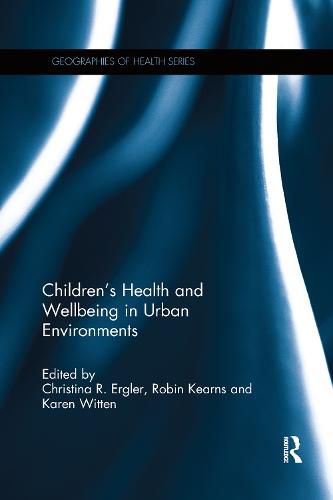Readings Newsletter
Become a Readings Member to make your shopping experience even easier.
Sign in or sign up for free!
You’re not far away from qualifying for FREE standard shipping within Australia
You’ve qualified for FREE standard shipping within Australia
The cart is loading…






How children experience, negotiate and connect with or resist their surroundings impacts on their health and wellbeing. In cities, various aspects of the physical and social environment can affect children’s wellbeing. This edited collection brings together different accounts and experiences of children’s health and wellbeing in urban environments from majority and minority world perspectives.
Privileging children’s expertise, this timely volume explicitly explores the relationships between health, wellbeing and place. To demonstrate the importance of a place-based understanding of urban children’s health and wellbeing, the authors unpack the meanings of the physical, social and symbolic environments that constrain or enable children’s flourishing in urban environments. Drawing on the expertise of geographers, educationists, anthropologists, psychologists, planners and public health researchers, as well as nurses and social workers, this book, above all, sees children as the experts on their experiences of the issues that affect their wellbeing.
Children’s Health and Wellbeing in Urban Environments will be fascinating reading for anyone with an interest in cultural geography, urban geography, environmental geography, children’s health, youth studies or urban planning.
$9.00 standard shipping within Australia
FREE standard shipping within Australia for orders over $100.00
Express & International shipping calculated at checkout
How children experience, negotiate and connect with or resist their surroundings impacts on their health and wellbeing. In cities, various aspects of the physical and social environment can affect children’s wellbeing. This edited collection brings together different accounts and experiences of children’s health and wellbeing in urban environments from majority and minority world perspectives.
Privileging children’s expertise, this timely volume explicitly explores the relationships between health, wellbeing and place. To demonstrate the importance of a place-based understanding of urban children’s health and wellbeing, the authors unpack the meanings of the physical, social and symbolic environments that constrain or enable children’s flourishing in urban environments. Drawing on the expertise of geographers, educationists, anthropologists, psychologists, planners and public health researchers, as well as nurses and social workers, this book, above all, sees children as the experts on their experiences of the issues that affect their wellbeing.
Children’s Health and Wellbeing in Urban Environments will be fascinating reading for anyone with an interest in cultural geography, urban geography, environmental geography, children’s health, youth studies or urban planning.